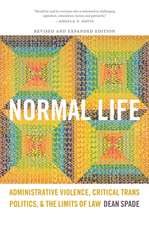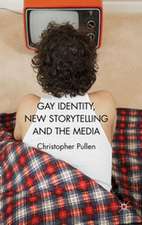Learning Queer Identity in the Digital Age
Autor Kay Siebleren Limba Engleză Hardback – 17 iun 2016
| Toate formatele și edițiile | Preț | Express |
|---|---|---|
| Paperback (1) | 634.82 lei 6-8 săpt. | |
| Palgrave Macmillan UK – 30 mai 2018 | 634.82 lei 6-8 săpt. | |
| Hardback (1) | 641.03 lei 6-8 săpt. | |
| Palgrave Macmillan UK – 17 iun 2016 | 641.03 lei 6-8 săpt. |
Preț: 641.03 lei
Preț vechi: 754.15 lei
-15% Nou
Puncte Express: 962
Preț estimativ în valută:
122.68€ • 133.21$ • 103.05£
122.68€ • 133.21$ • 103.05£
Carte tipărită la comandă
Livrare economică 23 aprilie-07 mai
Preluare comenzi: 021 569.72.76
Specificații
ISBN-13: 9781137603227
ISBN-10: 1137603224
Pagini: 193
Ilustrații: XI, 201 p.
Dimensiuni: 148 x 210 x 17 mm
Greutate: 0.44 kg
Ediția:1st ed. 2016
Editura: Palgrave Macmillan UK
Colecția Palgrave Macmillan
Locul publicării:London, United Kingdom
ISBN-10: 1137603224
Pagini: 193
Ilustrații: XI, 201 p.
Dimensiuni: 148 x 210 x 17 mm
Greutate: 0.44 kg
Ediția:1st ed. 2016
Editura: Palgrave Macmillan UK
Colecția Palgrave Macmillan
Locul publicării:London, United Kingdom
Cuprins
Introduction: LGBT Identity and Selling Queer.- 1 Queerness in the Digital Environment.- 2 Virtual Generation Gaps and By What Means “Community”.- 3 Lesbian Chic in the Digital Age.- 4 The Digital Swish of Gay Identity.- 5 Transgender Transitions: Sex/Gender Binaries in the Digital Age.- 6 Transqueer Representations: Educating Against the Binaries.
Notă biografică
Kay Siebler is Professor of English and Gender and Power Studies coordinator at Missouri Western State University, USA. She has published on topics of queer identity, feminist rhetoric, teaching, student-centered learning, and service learning. She is the author of Composing Feminisms (2008), which documents the impact of feminism and feminist teachers within the field of English education.
Textul de pe ultima copertă
This book explores, through specific analysis of media representations, personal interviews, and historical research, how the digital environment perpetuates harmful and limiting stereotypes of queerness. Siebler argues that heteronormativity has co-opted queer representations, largely in order to sell goods, surgeries, and lifestyles, reinforcing instead of disrupting the masculine and feminine heterosexual binaries through capitalist consumption. Learning Queer Identity in the Digital Age focuses on different identity populations (gay, lesbian, transgender) and examines the theories (queer, feminist, and media theories) in conjunction with contemporary representations of each identity group. In the twenty-first century, social media, dating sites, social activist sites, and videos/films, are primary educators of social identity. For gay, lesbian, bisexual, transgendered, and transsexual peoples, these digital interactions help shape queer identities and communities.












